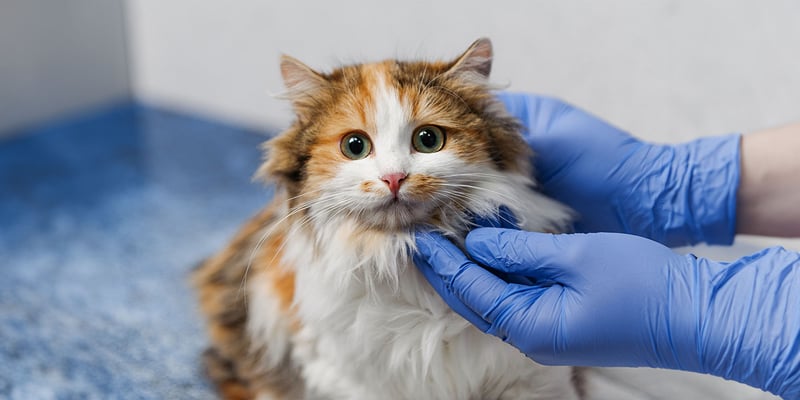Index:



Summary
Do I need pet insurance?
When making any financial decision it is always a good idea to research all your options. We know firsthand the stress and uncertainty that comes with navigating the world of pet care finances, and we want to provide you some points, facts and figures to help you come up with a the solution that works best for you on how you plan to look after your pet's wellbeing.
When you boil it down, you really only have four options when it comes to handling future vet bills:
1. Pet insurance
2. Self-insurance
3. Charity
4. Risking it (Prevention)
In this blog we will delve into what you can expect along your pet's welfare journey, and what are the main things you should consider out of the four options.
Vet bills
Let's start with getting an idea of what to expect in vet bills during the course of your pet's life.
Vet bills can vary a lot based on your pet's breed, age, and where your vet is located. According to the Association of British Insurers (ABI), the average claim has gone up by 39% since 2012, from £555 to £771.
When pets are young, accidents and injuries make up a good chunk of vet visits. Around 30% of our claims for puppies and kittens relate to accidents and injuries. These bills usually happen once, but they can cost you about £680 on average. Chronic conditions account for about 17% of claims for puppies and kittens, jumping to 26% in their second year of life.
In the prime of their life, typically between 3 and 7 for dogs, and 3 and 9 for cats, pets are generally healthy. But around age 5, cancer becomes more common, making up about 5 - 8% of all claims. Treating cancer can be pricey, with an average bill of around £1,000.
As pets get older, around 8 for dogs and 10 for cats, they start needing more vet visits. Accidents happen less often, while illnesses and cancer become more common. On average, 10 - 15% of claims are for accidents, 70 - 80% for illnesses, and roughly 10% for cancer. Chronic conditions also become more frequent, going from around 30% of claims in mid-life to over 50% by age 14.
The type of breed you have also plays a big role in your vet bills. Some breeds are more prone to certain health issues. For example, French Bulldogs often have problems with Brachycephalic Airway Obstruction Syndrome (BAOS), which can rack up big vet bills.
Make sure to do your research and talking to other pet owners with the same breed to get a sense of what to expect in terms of vet bills for your pet.
“You may be able to save a few pounds a month with a cheap pet insurance policy, but you need to consider what that policy covers and the actual cost of veterinary care if your pet were to ever get sick.
If you are unsure of how much cover your pet needs, I recommend speaking to your vet about the common conditions that could affect your pet in the future and the expected costs. This will help you find the right cover to match you and your pets needs.”
Dr Lauren Chong, Pet Insurance Expert & Registered Vet at MoneySuperMarket:
Alternatives to pet insurance
Self-insure
You always have the option to set aside money for potential vet bills down the road. But before you decide to do that, let's chat about some things you should keep in mind.
First off, there's the risk of not having enough saved up when your pet needs medical attention, especially if you have a playful pup or curious kitten prone to accidents.
Then, there's the possibility of using up your savings if your pet faces ongoing health issues. For instance, treatments for conditions like cancer can add up to thousands over time. Let's do some quick math: if you saved the average monthly insurance premium of £25 for 5 years, that's £1,500. It might cover initial treatments, but if your pet needs continuous care year after year, those funds could dwindle fast.
Lastly, consider the hefty bills that could arise if your pet accidentally injures someone or damages property, and you're held responsible for medical or legal expenses. Most pet insurance policies include coverage for such situations under Public Liability or Third Party Liability, offering coverage ranging from £1,000,000 to £2,000,000.
Setting money aside is an option, but just make sure to weigh it against the amount of disposable income you have available.
Charities
There is always the option to use a charity, but these are mainly used if your pet needs expensive treatment, and you don’t have insurance or can’t afford to cover the cost. The wait time can also be lengthy to schedule in your pet's treatment.
Here is a list of some of these wonderful charities:
Risk it
You can choose to take your chances and focus on preventing any health problems from popping up in the first place. But let's face it, pets are bound to be playful and accidents can happen, leading to unexpected vet bills. So, it's all about considering whether the potential stress down the line is worth it.
Choosing pet insurance
Pet insurance remains a fantastic solution for tackling the worry of not being able to handle future vet bills. These policies are specifically designed to cover medical expenses resulting from unexpected accidents, illnesses, and injuries that may befall your pet. Plus, they include coverage for those hefty bills stemming from property damage or medical expenses for others.
Policies have your back during the rambunctious early years when puppies and kittens are at their most playful, and they're there to support you through ongoing conditions as well.
However, it's crucial to choose the right type of pet insurance.
Types of pet insurance
There are four main types of pet insurance policies on the market:
Accident-only
Maximum benefit
Time-covered
Lifetime
Accident-only: This type of insurance pays out claims that are only related to accidents your puppy may have. This means that you won't be able to claim for any illness conditions such as diarrhoea and vomiting.
Max benefit: Maximum Benefit policies are known as "condition-based" policies. What that means is that you are able to claim up to a chosen limit for a specific condition, and once that limit has been reached, it will be excluded from your coverage and you can no longer claim for that condition again. The major draw back with these policies is that you will find it tricky to swap to a new insurance provider, as most insurers will class the condition as pre-existing and will not cover vet bills for the condition.
Time-covered: Time-Limited policies are another type of "condition-based" policy. Under this kind of insurance policy, coverage is provided for a condition for up to a limit and a particular period of time, normally 12 months. Much like a Maximum Benefit policy you cannot make claims beyond the limit you chose, but you also have the restriction that you only have a certain amount of time to claim before it will be excluded from coverage.
Again, you will find it tricky to swap to a new insurance provider, as any claimed condition will likely be deemed as a pre-existing condition, and you will not be able to claim for the condition.
Lifetime: A Lifetime policy means that the limit you select to cover vet bills in a year will be replenished every year. That way, so as long as you keep your policy active, your pet will be covered for life, hence why most pet owners choose it.
At Waggel, we only offer Lifetime policies, as we don't people want people ending up with nasty surprises. We want to be there for you and your pet throughout their lifetime.
If you think pet insurance is right for you, make sure to read our blog post on specific things you need to know about pet insurance.



5 benefits of pet insurance
You can choose your vet for treatment
Unlike human health insurance that requires you to see specific doctors, pet insurance gives you the freedom and flexibility to choose whichever vet you want to go to.
So whether it is a vet that’s convenient for you or one you trust from previous experience/referrals from friends and family, it’s your choice.
No compromise on care
Having pet insurance means you don’t have to compromise on the level of care your pet receives based on any personal restrictions.
Whether it is the financial paying for treatments or the knowledge of how and when to get treatment, your pet insurance will cover and answer all of these things.
Accidents/emergency care
Especially out of hours, accidents and emergency care can be very expensive. Out of the blue expensive treatments can be a big issue for people without insurance.
Whereas, if you have pet insurance and an accident happens out of hours, for instance your dog eats a raisin (which can be very pricey), your pet insurance can cover this.
Avoid dipping into personal/family savings
Let’s be honest, life doesn’t always go according to plan. Unexpected events happen, and savings have to be dipped into from time to time.
Having pet insurance means covering the costs of any accidents, treatments, or emergency care, meaning you don't have to dip into your savings.
Your own guardian angel
With pet insurance, you have that added peace of mind knowing that your insurer is always there for you. Looking over you and your pet so that if anything does happen to your pet (touch wood), you will be protected.
Waggel also offers unlimited free 24/7 vet video calls and free dog behaviour and pet nutrition consultations so there are always experts on hand to keep you and your pet safe and happy.
Things to be aware of
Things pet insurance doesn't cover
Pre-existing conditions: any condition or symptom that has occurred before you have set up your insurance policy that you have visited the vet for in the past is considered pre-existing and most insurance companies won’t cover it. This is why it is always advisable to get insurance as soon as possible after getting your beloved pet.
Warm up period: most pet insurance companies have a warm up period of variable time, usually 14 days, which begins from the original inception date. Any symptom or condition that is presented within this time cannot be claimed for and moving forward will be classed as a pre-existing condition.
Routine treatments: These aren’t covered. This includes things like vaccinations, flea and worming treatments, nail clips, grooming, neutering (castration/spay), routine dental checks/scale and polish.



FAQs
Do vets recommend pet insurance?
Yes! Here is what Dr Jessica May MRCVS says about it:
“We want animals/pets to have the very best care when they need it. We know that vet bills can be expensive and that is why insurance for your pet provides pet owners with help and reassurance, especially in times of need.
We recommend pet insurance so that you don’t have to worry about the cost of treatment when an accident or illness occurs. ”
-Dr Jessica May MRCVS
Do all vets take pet insurance?
Almost all vets will recommend insurance - most can offer 4 weeks free insurance for new pets. In terms of taking payment directly from insurance companies, most do but some don’t so it is always worth checking beforehand.
When should I get pet insurance?
For younger pets: Don’t wait for a problem to happen and then think about insurance. It is common for puppies to get sick when they first come home - any issues before you take out insurance will be classified as pre-existing conditions.
For older pets: There’s no wrong time to take out insurance as you never know what may happen. However, with older pets you may want to weigh up the pros/cons of what would be covered and if it is financially beneficial. There is always a risk of pets of any age getting into an accident, which insurance can of course help. Important to remember though, certain illnesses may not be covered when older as they may be deemed pre-existing conditions.
For all pets: When looking at taking out pet insurance, always pick one you'd be happy to stay with for life. Switching between companies can result in pre-existing conditions, meaning you will be covered for less, and is a lot of unwanted hassle.
Who should consider pet insurance?
Everyone and anyone who wants peace of mind and a safety net for future potential veterinary costs for their pet.
Why should I have pet insurance?
Pet insurance is there to cover the unexpected and unknown costs when pets get ill or have an accident. It's peace of mind that if something were to happen you won’t have to worry about the financial burden it may cause.
When your pet is unwell it can be extremely stressful on its own, let alone having to worry about vet bills. Pet insurance can alleviate some of the stress that comes with owning a pet giving you more freedom to focus on the good times.
How can pet insurance help me pay for visits to the vet?
Pet insurance can help cover for costs related to illness, accidents, and injuries (provided they are not related to pre-existing issues). For instance, at Waggel we can either reimburse costs you have paid to the vet or, if approved by your vet, we can pay the vet practice directly.
Conclusion
Pet insurance should be on the forefront of new pet owners’ minds and we hope that this article has given you a deep insight into the reasons behind it - and you realise it’s not just us, a pet insurance company, being biased.
Learn more on what makes Waggel the right choice for you.
Waggel Pet Insurance
Need more help? You're in luck if you're a Waggel Pet Insurance member. Along with our excellent coverage, we offer access to a 24/7 online vet to answer all your sticky questions, especially if you need grooming assistance.
Not a member? Why not get a quote now and cover your furry friend for a range of illnesses, all while enjoying our amazing perks and rewards.
Want more like this?
Get updates from us with helpful info, advice, answers to frequently asked questions and much more.
Index:
Related posts:
Get your quote
Along with our excellent coverage, we offer access to a 24/7 online vet to answer all your sticky questions.





